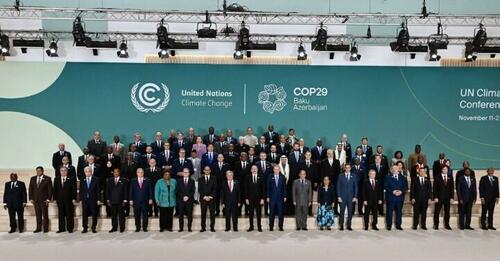
Striking a 'climate finance' deal at this year's COP29 summit wasn't easy, capping off a summit in Azerbaijan that was fraught with unenthusiastic participants and reports of counterintuitive dealmaking.
When all was said and done nearly 200 countries agreed to triple funding to help developing nations address climate change, with wealthy nations pledging at least $300 billion annually by 2035 through various sources, according to Bloomberg.
The deal aims to mobilize $1.3 trillion annually, primarily from private funding. In a compromise, rich nations committed an additional $50 billion beyond a previous draft and tied the agreement to reaffirming last year’s COP28 pledge to transition away from fossil fuels.
Bloomberg wrote that the $300 billion annual pledge by 2035 falls short of the trillions developing nations need to combat climate change, with many calling for more grants and affordable financial support rather than loans that increase debt.
While some criticized the outcome as inadequate, others viewed it as a vital step in sustaining multilateral efforts. The agreement will guide future emissions-cutting pledges for 2035 and set the stage for the next UN climate summit in Brazil.
Opposition led by Saudi Arabia and other Arab nations resulted in the final agreement avoiding direct mention of fossil fuels, merely reiterating the previous commitment. Despite protests from countries like India, which called the funding “too little, too distant,” the deal was adopted.
Recall we wrote days ago that Saudi Arabia was reportedly "leading a push back" on restating climate commitments to transition away from fossil fuels put into place last year.
Saudi Arabia was reportedly using "a mix of delaying tactics and outright blocking maneuvers" to resist these efforts.
Last year, COP28 marked the first inclusion of a fossil fuel phase-out in its final agreement, with the UAE securing support from Saudi Arabia and other oil producers. Developed and climate-vulnerable nations see any weakening of that language as a significant setback.
This year’s COP29 negotiations are focused on scaling up climate finance to over $1 trillion annually, pressuring nations like Saudi Arabia to contribute more, while also solidifying commitments made last year to phase down fossil fuels and accelerate renewable energy.
We also wrote earlier this month that a senior COP29 official in Azerbaijan reportedly used his role as heading up the fight on climate change...to secure meetings with potential investors in the country’s oil and gas sectors.
SOCAR, Azerbaijan’s state oil company, reportedly responded to a fake investment group, indicating interest in meeting, according to Global Witness. In the meeting, COP29 head and Azerbaijan's Deputy Energy Minister Elnur Soltanov discussed the event’s goals, stating that COP aims to “solve the climate crisis” by “transitioning away from hydrocarbons.”
Still, he expressed openness to oil and gas investments, pointing to Azerbaijan’s gas expansion plans and new pipeline infrastructure. This marked the second year a petro-state has used its COP presidency to promote fossil fuel interests, raising questions for the UN on oversight.
Striking a ‘climate finance’ deal at this year’s COP29 summit wasn’t easy, capping off a summit in Azerbaijan that was fraught with unenthusiastic participants and reports of counterintuitive dealmaking.
When all was said and done nearly 200 countries agreed to triple funding to help developing nations address climate change, with wealthy nations pledging at least $300 billion annually by 2035 through various sources, according to Bloomberg.
The deal aims to mobilize $1.3 trillion annually, primarily from private funding. In a compromise, rich nations committed an additional $50 billion beyond a previous draft and tied the agreement to reaffirming last year’s COP28 pledge to transition away from fossil fuels.
Bloomberg wrote that the $300 billion annual pledge by 2035 falls short of the trillions developing nations need to combat climate change, with many calling for more grants and affordable financial support rather than loans that increase debt.
While some criticized the outcome as inadequate, others viewed it as a vital step in sustaining multilateral efforts. The agreement will guide future emissions-cutting pledges for 2035 and set the stage for the next UN climate summit in Brazil.
Opposition led by Saudi Arabia and other Arab nations resulted in the final agreement avoiding direct mention of fossil fuels, merely reiterating the previous commitment. Despite protests from countries like India, which called the funding “too little, too distant,” the deal was adopted.
Recall we wrote days ago that Saudi Arabia was reportedly “leading a push back” on restating climate commitments to transition away from fossil fuels put into place last year.
Saudi Arabia was reportedly using “a mix of delaying tactics and outright blocking maneuvers” to resist these efforts.
Last year, COP28 marked the first inclusion of a fossil fuel phase-out in its final agreement, with the UAE securing support from Saudi Arabia and other oil producers. Developed and climate-vulnerable nations see any weakening of that language as a significant setback.
This year’s COP29 negotiations are focused on scaling up climate finance to over $1 trillion annually, pressuring nations like Saudi Arabia to contribute more, while also solidifying commitments made last year to phase down fossil fuels and accelerate renewable energy.
We also wrote earlier this month that a senior COP29 official in Azerbaijan reportedly used his role as heading up the fight on climate change…to secure meetings with potential investors in the country’s oil and gas sectors.
SOCAR, Azerbaijan’s state oil company, reportedly responded to a fake investment group, indicating interest in meeting, according to Global Witness. In the meeting, COP29 head and Azerbaijan’s Deputy Energy Minister Elnur Soltanov discussed the event’s goals, stating that COP aims to “solve the climate crisis” by “transitioning away from hydrocarbons.”
Still, he expressed openness to oil and gas investments, pointing to Azerbaijan’s gas expansion plans and new pipeline infrastructure. This marked the second year a petro-state has used its COP presidency to promote fossil fuel interests, raising questions for the UN on oversight.
Loading…





